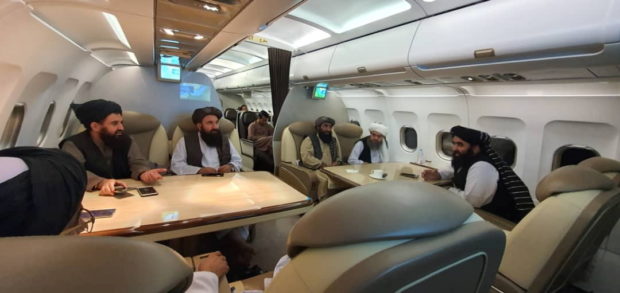US says Taliban talks in Doha were ‘candid and professional’

FILE PHOTO: Taliban delegates are seated in a plane in an unidentified location, in this handout photo uploaded to social media on October 9, 2021. Picture uploaded on on October 9, 2021. Social media handout/via REUTERS
WASHINGTON — The United States said on Sunday the first face-to-face meeting between senior U.S. and Taliban officials since the hardline group retook power in Afghanistan was “candid and professional” and that the U.S. side reiterated that the Taliban would be judged on their actions, not just their words.
State Department spokesman Ned Price said the U.S. delegation in the weekend talks in Doha, Qatar, focused on security and terrorism concerns and safe passage for U.S. citizens, other foreign nationals and Afghans, as well as on human rights, including the meaningful participation of women and girls in all aspects of Afghan society.
He said the two sides also discussed “the United States’ provision of robust humanitarian assistance, directly to the Afghan people.”
“The discussions were candid and professional with the U.S. delegation reiterating that the Taliban will be judged on its actions, not only its words,” Price said in a statement.
It did not say if any agreements were reached.
Article continues after this advertisementOn Saturday, Qatar-based Al Jazeera television quoted Afghanistan’s acting foreign minister as saying that Taliban representatives asked the U.S. side to lift a ban on Afghan central bank reserves.
Article continues after this advertisementIt said the minister, Amir Khan Muttaqi, also said Washington would offer Afghans coronavirus vaccines and that the two sides discussed “opening a new page” between the two countries.
Biden administration officials told Reuters on Friday the U.S. delegation would press the Taliban to release kidnapped American Mark Frerichs. Another top priority would be to hold the Taliban to their commitment not to allow Afghanistan to again become a hotbed for al Qaeda or other extremists.
The Taliban took back power in Afghanistan in August, almost 20 years after they were ousted in a U.S.-led invasion for refusing to hand over al Qaeda leader Osama bin Laden following the Sept. 11, 2001, attacks on the United States.
The U.S. officials said the weekend meeting was a continuation of “pragmatic engagements” with the Taliban and “not about granting recognition or conferring legitimacy” to the group.
U.S. officials say they are in contact with dozens of Americans and legal permanent residents who wish to leave Afghanistan and there are thousands of U.S.-allied Afghans at risk of Taliban persecution still in the country.
Washington and other Western countries are grappling with difficult choices as a severe humanitarian crisis looms large in Afghanistan. They are trying to work out how to engage with the Taliban without granting the group the legitimacy it seeks, while ensuring humanitarian aid flows into the country.